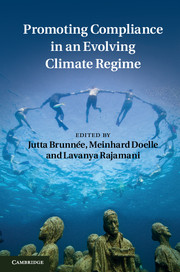Book contents
- Frontmatter
- Contents
- Contributors
- Preface
- Abbreviations
- Introduction: The role of compliance in an evolving climate regime
- Part I Context
- 1 The emerging post-Cancun climate regime
- 2 Promoting compliance with multilateral environmental agreements
- 3 Compliance regimes in multilateral environmental agreements
- Part II The Kyoto compliance system: Features and experience
- Part III Compliance and the climate regime: Issues, options, and challenges
- Part IV A look forward
- Bibliography
- Index
- References
2 - Promoting compliance with multilateral environmental agreements
Published online by Cambridge University Press: 05 January 2012
- Frontmatter
- Contents
- Contributors
- Preface
- Abbreviations
- Introduction: The role of compliance in an evolving climate regime
- Part I Context
- 1 The emerging post-Cancun climate regime
- 2 Promoting compliance with multilateral environmental agreements
- 3 Compliance regimes in multilateral environmental agreements
- Part II The Kyoto compliance system: Features and experience
- Part III Compliance and the climate regime: Issues, options, and challenges
- Part IV A look forward
- Bibliography
- Index
- References
Summary
Introduction
International lawyers have not traditionally concerned themselves with compliance issues. Or, to be more precise, the lawyer’s traditional role has been to offer a legal assessment of whether or not a particular state was in compliance with its international legal commitments. If a state was not in compliance, lawyers would advise on the legal consequences and on the available avenues for dispute settlement or enforcement. By contrast, international lawyers did not inquire into the explanations for states’ compliance or non-compliance with international commitments, or into suitable strategies for promoting compliance.
These questions were seen to be within the purview of another discipline, that of international relations (IR). In the context of multilateral environmental agreements (MEAs), however, the international lawyer’s traditional compliance toolkit has so far been of limited utility. The law of state responsibility and the dispute settlement clauses in MEAs have remained largely unused. What is more, given states’ collective interest in the effectiveness of MEAs as problem-solving devices, policy-makers have tended to prefer promotion of compliance to enforcing legal responsibility for breaches of law. Hence the MEA context was one of the first in which a lively exchange emerged between international lawyers and IR scholars on compliance issues.
- Type
- Chapter
- Information
- Promoting Compliance in an Evolving Climate Regime , pp. 38 - 54Publisher: Cambridge University PressPrint publication year: 2011
References
- 3
- Cited by



